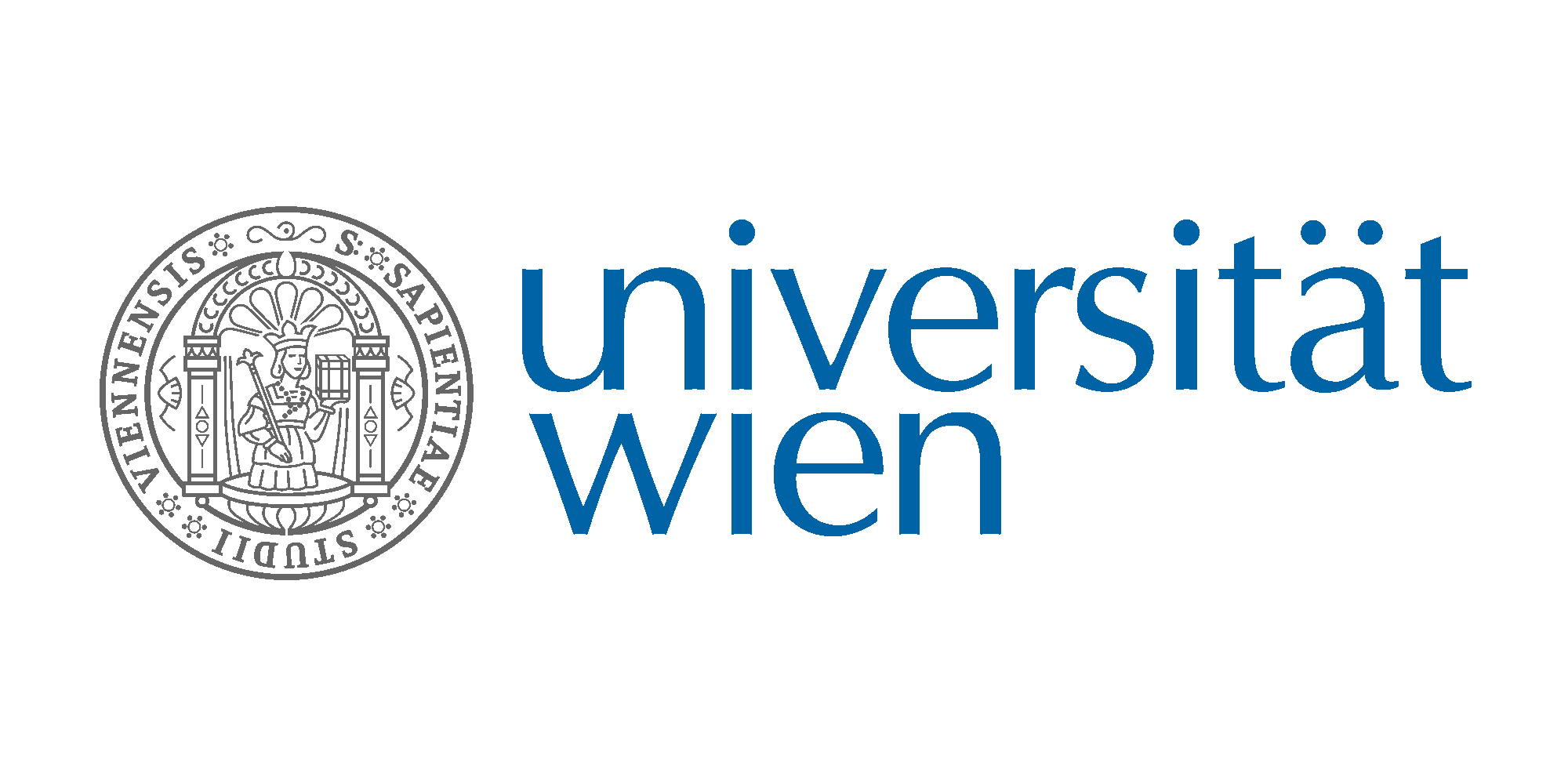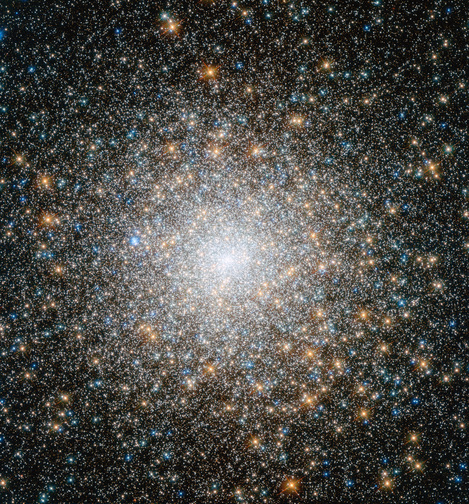Vienna Dynamics Workshop
8 - 11 October 2019, Vienna
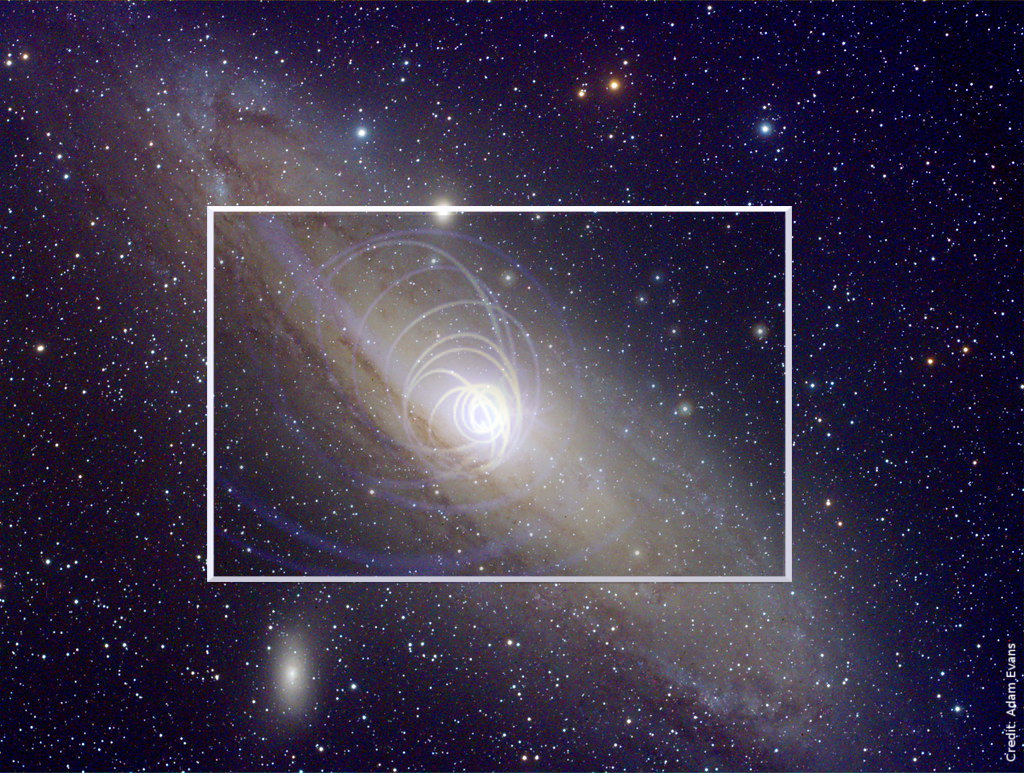
The study of galactic dynamics is crucial for understanding the formation and ongoing evolution of galaxies. It enables us to determine the total mass of the stellar system, constrain the dark matter distribution, the initial mass function and central black hole masses. The aim of the workshop is for the participants to learn how to construct triaxial Schwarzschild orbit-based dynamical models.
Over the past decade we have developed a unique numerical code which enables us to build fully 6D phase-space models of nearby galaxies. Our code first computes a library of tens of thousands of stellar orbits and then finds the orbital weights that yield the best-fit to the projected stellar light and motions of nearby galaxies as observed with state-of-the art spectrographs. The resulting best-fit models allow us to infer the luminous as well as dark matter distribution of the galaxies, including central black holes and dark haloes. Moreover, the orbit-based reconstruction provides a direct insight into the assembly history of galaxies as we showed for a sample of nearly 300 galaxies in our Nature Astronomy paper of last year.
During this workshop we provide lectures on galaxy dynamics in the mornings, followed by on-hand sessions in the afternoon to build own orbit-based galaxy models on Vienna Scientific Cluster (VSC).
Programme
A printable version can be found here. The talks of the lectures will be linked soon!
| Monday 7th | ||
| 15:00 - 16:30 @Lecture Hall | Astroph. Colloquium Ling Zhu |
Disentangling galaxy formation history through a (population-) orbit superposition model |
| 18:00 | Colloquium Dinner | Ristorante Spumante |
| Tuesday 8th | ||
| 9:30 - 9:45 @Seminar room 1 | Glenn van de Ven & Ling Zhu | Welcome & goals of the Workshop |
| 9:45 - 10:15 | All | Introduction via 'Business Cards' |
| 10:15 - 10:45 | Glenn van de Ven | Galaxy dynamics I |
| 10:45 - 11:15 | Coffee Break | |
| 11:15 - 11:45 | Ling Zhu | Schwarzschild models I |
| 11:45 - 12:30 | Eugene Vasiliev | Schwarzschild models of barred galaxies |
| 12:30 - 13:30 @Social room | Lunch (w/ sandwiches) | |
| 13:30 - 14:15 @PC-lab |
All | Constructing Multi-Gaussian Expansion models |
| 14:15 - 15:00 | All | Preparing stellar kinematic data |
| 15:00 - 15:30 | Coffee Break | |
| 15:30 - 16:15 | All | Setting Schwarzschild model hyper-parameters |
| 16:15 - 17:00 | All | Starting first Schwarzschild model runs |
| Wednesday 9th | ||
| 9:30 - 10:15 @Seminar room 1 | Glenn van de Ven | Galaxy dynamics II |
| 10:15 - 10:45 | Ling Zhu | Schwarzschild models II |
| 10:45 - 11:15 | Coffee Break | |
| 11:15 - 12:30 | All | Evaluating current best-fit Schwarzschild model I |
| 12:30 - 13:30 @Social room | Lunch (w/ sandwiches) | |
| 13:30 - 15:00 @PC-lab |
All | Evaluating current best-fit Schwarzschild model II |
| 15:00 - 15:30 | Coffee Break | |
| 15:30 - 16:15 | All | Deciding on a galaxy per group |
| 16:15 - 17:00 | All | Starting model grid per group |
| 17:30 - 18:30 | Oliver Czoske | Guided tour through observatory |
| 19:00 | Workshop dinner | Heuriger Pötzleinsdorf |
| Thursday 10th | ||
| 9:30 - 10:00 @Seminar room 1 | Alireza Molaeinezhad | NGC 7457: Evidence for merger-driven cylindrical rotation in disc galaxies |
| 10:00 - 10:30 | Katja Fahrion | Unveiling the origin of kinematic decoupled components with Schwarzschild modeling |
| 10:30 - 11:00 | Coffee Break | |
| 11:00 - 11:45 | Ester Pozna | Software Lifecycle in Astronomy |
| 11:45 - 12:30 | All | Extracting and evaluating models per group |
| 12:30 - 13:30 @Social room | Lunch (w/ sandwiches) | |
| 13:30 - 15:00 @PC-lab |
All | Preparing presentation per group I |
| 15:00 - 15:30 | Coffee Break | |
| 15:30 - 17:00 | All | Preparing presentation per group II |
| Friday 11th | ||
| 9:30 - 9:50 @Seminar room 1 | Group 1 | Presentation Schwarzschild model |
| 9:55 - 10:15 | Group 2 | Presentation Schwarzschild model |
| 10:15 - 10:30 | Coffee Break | |
| 10:30 - 10:50 | Group 3 | Presentation Schwarzschild model |
| 10:55 - 11:25 | Group 4 | Presentation Schwarzschild model |
| 11:30 - 12:15 @Lecture Hall | Stefan Wallner | Measuring and modelling night sky brightness - The impact of light pollution |
| 12:15 - 11:45 | Benjamin Boizelle | Precision Black hole mass measurement with ALMA |
| 12:45 - 13:30 @Social room | Lunch (w/ pizza's) | |
| 13:30 - 15:00 @PC-lab | Ling Zhu & Glenn van de Ven |
Questions, Feedback & Farewell |
Participants
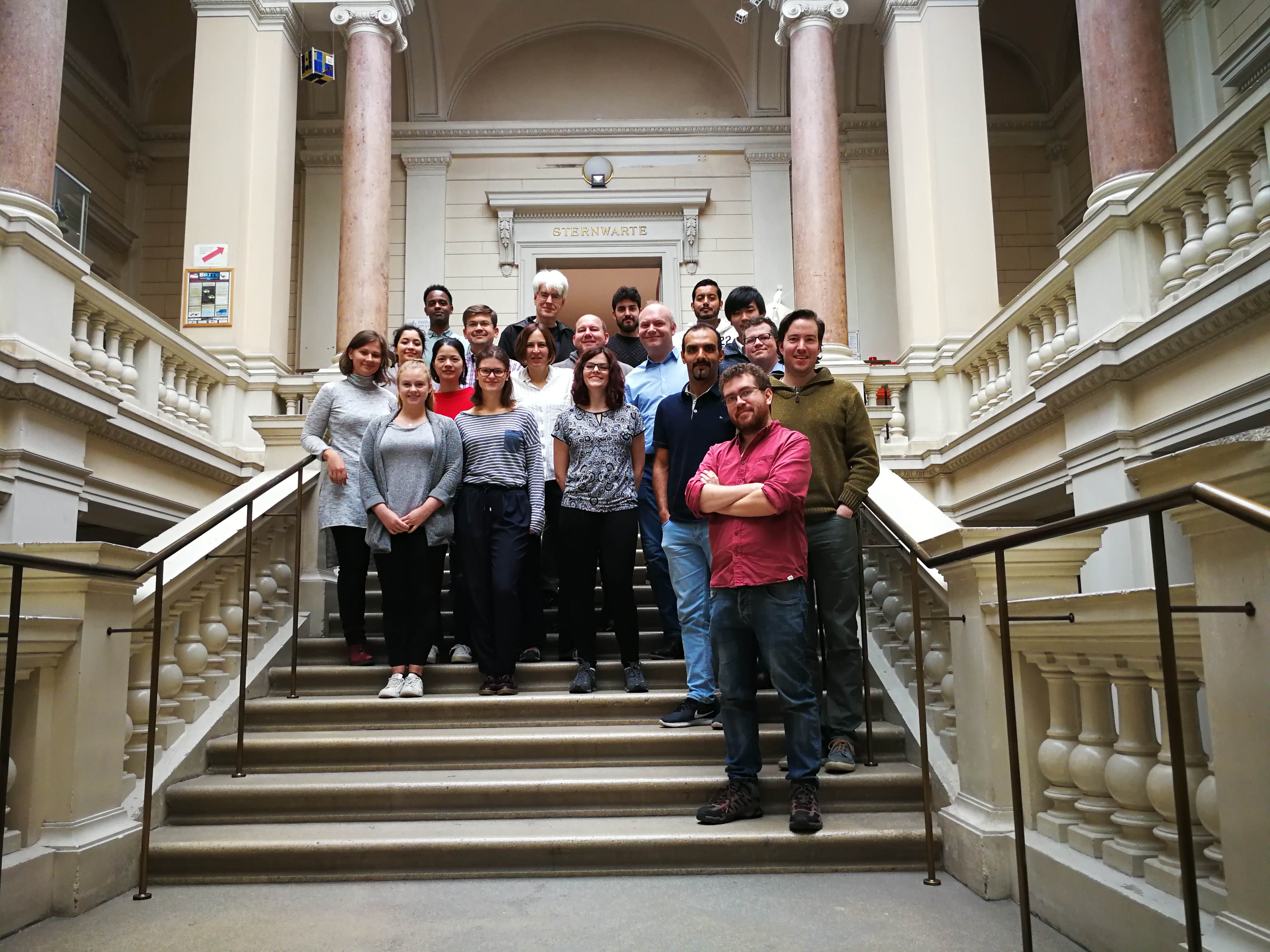
| Names | Affiliation | Lecture |
| Katja Fahrion | ESO, Germany | yes |
| Alireza Molaeinezhad | IAC, Spain | yes |
| Eszter Pozna | ESO, Germany | yes |
| Glenn van de Ven | UniVie, Austria | yes |
| Eugene Vasiliev | Oxford Univ., UK | yes |
| Ling Zhu | SHAO, China | yes |
| Francisco Aros | UniVie, Austria | no |
| Erik Aquino Ortiz | UNAM Mexico | no |
| Bahar Bidaran | ZAH, Germany | no |
| Benjamin Boizelle | Texas A&M Univ | no |
| Mario Chamorro Cazorla | UCM, Spain | no |
| Oliver Czoske | UniVie, Austria | no |
| Nguyen Duc Dieu | NAOJ, Japan | no |
| Bililign T. Dullo | UCM, Spain | no |
| Jesus Falcon Barroso | IAC, Spain | no |
| Meghan Hughes | ESO, Germany | no |
| Prashin Jethwa | UniVie, Austria | no |
| Davor Krajnovic | AIP, Germany | no |
| Ryan Leaman | MPIA, Germany | no |
| Laura Posch | UniVie, Austria | no |
| Sabine Thater | UniVie, Austria | no |
| Takafumi Tsukui | NAOJ, Japan | no |
| Tadeja Veršič | UniVie, Austria | no |
Logistics
Workshop Venue
The workshop will take place at the Department of Astrophysics, Türkenschanzstraße 17, 1180 Vienna, Austria. This is in a beautiful monumental observatory located about 5 km north-west of the city centre.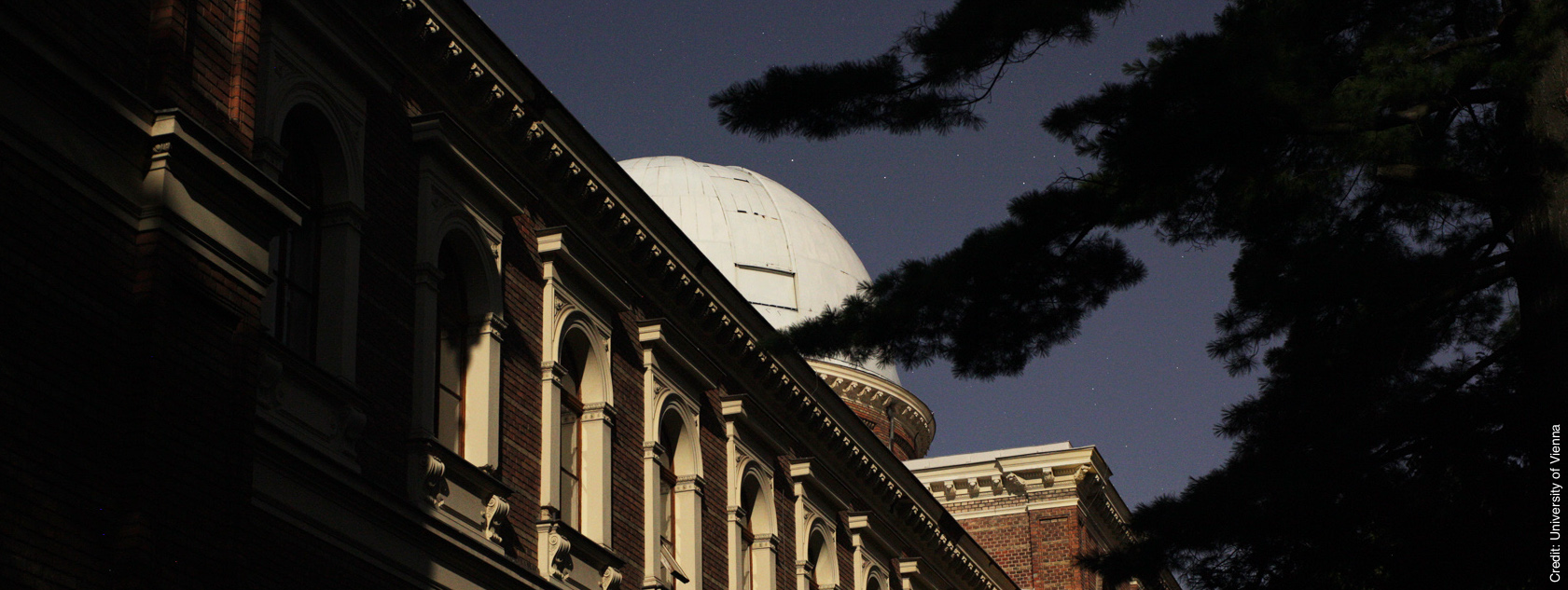
Getting to the Workshop Venue
Vienna has a very efficient and affordable public transport. We highly recommend that you use the WienMobil App.
You can buy online or at machines in most train/underground stations (though not bus/tram stations) a week ticket valid Mon 7 Oct 9 am through Mon 14 Oct 9 am (fixed period) or a 3-day ticket for the same price of only EUR 17.10. The tickets can be used on all public transport means (bus, tram, underground, train) within the so-called 'Kernzone' of Vienna. For further information see the Ticket Guide.
There are three stations near the observatory: Gregor-Mendel-Strasse, Aumannplatz and Gersthof. The main entrance is located at Türkenschanzstrasse 17 (northeast of the park). But depending on the station you come from, the entrance at the corner Türkenschanzstrasse / Edmund-Weiss-Gasse (south-east) may be more convenient. Make sure to push the button to open the door. A short walk through the park will take you to the observatory.
Getting to the Workshop Dinner
We would be pleased to welcome you to our workshop dinner on Wed 9 Oct 7pm at Heuriger Pötzleinsdorf, Pötzleinsdorferstrasse 97, 1180 Vienna.Getting to Vienna from the airport
Vienna International Airport (VIE) is located about 25 km south-east of the city centre and unfortunately just outside of this 'Kernzone' but well connected with trains. If you have already bought a week-ticket online, you can buy at the airport an additional ticket of EUR 1,80 until the 'Kernzone' or 'Vienna city limit'. You can also choose 'Schwechat' as destination to get this ticket of EUR 1,80. Otherwise you buy a regular ticket until the station closest to your hotel. Note that there is also the (green) City Airport Train (CAT) going into the centre of Vienna, but not much faster and more than twice as expensive as a regular train.Accommodation
Accommodation can be found via booking.com or airbnb.com. In case this is not possible, the astrophysics administration can try to book a room for you at Hotel Boltzmann for EUR 82 per night.Technical Requirements
Please make sure before you travel to Vienna that you have eduroam working on your laptop and have installed Python version 2.7 or 3.6 with external dependencies numpy and matplotlib version 2.2.1 or higher.
Scientific and local organizing committee
Scientific Organising Committee:
Glenn van de Ven (UniVie, Austria)Ling Zhu (SHAO, China)
Local Organising Committee:
Francisco Aros (UniVie, Austria)Martina Egger (UniVie, Austria)
Carmen Gruber (UniVie, Austria)
Prashin Jethwa (UniVie, Austria)
Anila Kreibich (UniVie, Austria)
Sabine Thater (UniVie, Austria)
Glenn van de Ven (UniVie, Austria)
Tadeja Veršič (UniVie, Austria)
Contact
In case you have questions please contact the astrophysics administration indicating in the subject line that it concerns the Vienna Dynamics Workshop.
Credits
ArcheoDyn is funded through a Consolidator Grant from the European Research Council (ERC) under the European Union's Horizon 2020 research and innovation programme (under grant agreement No 724857).
We also wish to thank the Department of Astrophysics at the
University of Vienna and the VSC team, in particular Claudia Blaas-Schenner,
for their support in preparation and organisation of this workshop.
